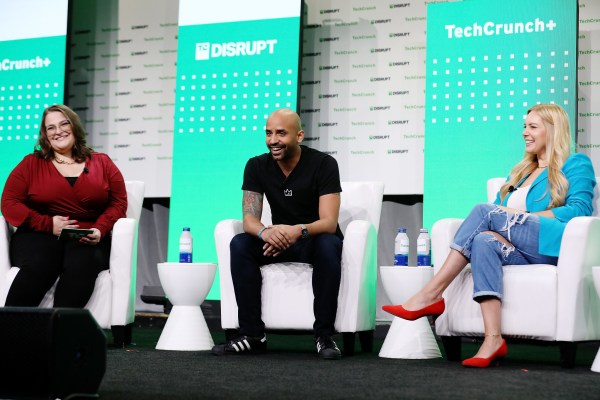In over a decade of investing in startups, Reddit co-founder Alexis Ohanian has only once offered to fund a founder on the spot. That founder was Josh Fabian, CEO of Metafy, a video game coaching platform.
“We were able to just engage and talk like humans, and Josh told us his story in a very different way,” said Katelin Holloway, a founding partner at 776, where Ohanian is general partner. “Not only was it incredibly compelling from a business perspective, it was incredibly compelling from a human perspective.”
As Fabian explained at TechCrunch Disrupt, Metafy has a pretty fun founding story. Once a competitive Yu-Gi-Oh player in his childhood, Fabian was working as a lead designer at Groupon when he became obsessed with mobile gaming.
“I would spend my bathroom breaks very productively playing a game called Clash Royale,” Fabian said. He eventually became one of the top 20 players in the world and streamed for up to 4,000 viewers on a daily basis, but he wasn’t making much money — that is, until fans started asking him to pay him for private coaching. In just six months, he made $40,000.
When Fabian’s children wanted to get better at the Pokémon Trading Card game, he hired one of the best players in the world.
“He offered to teach them for $20 an hour, which is less than what we pay our babysitter,” Fabian remembered. He said he asked the player if he did Pokémon full time, but the player said he worked a minimum wage job at a warehouse. That got Fabian thinking about building a business to let people in similar situations make a living off their gaming expertise.
This past February, Metafy raised a $25 million Series A round, co-led by 776 and Tiger Global.
Building in public
Metafy didn’t catch Holloway’s attention just because it’s a fun business idea with a charismatic founder. What sets Fabian apart is his company’s commitment to “building in public.” That means Metafy publishes all of its letters to investors on a public blog, documenting both the highs and lows of growing a startup from seed to Series A.
Fabian says he prizes this kind of transparency because he wants to build trust with consumers. “Consumers don’t trust corporations; I don’t trust corporations,” he told the Disrupt audience. “I don’t think any of you do, even if you’re running your own.”
But when Metafy goes through tough times, it still has to be honest about what’s going down. This was especially apparent in September, when Metafy had to lay off 23% of its team despite doubling its revenue.
“If you were fundraising last year, priorities were GMV and growth; not unit economics or revenue. There’s a new normal — if you want to stay alive, there’s no choice but to become more disciplined with not just spending but also product vision and direction,” Fabian told TechCrunch at the time of the layoffs. He had planned to raise a Series B shortly after Metafy’s Series A, but that didn’t pan out as the macroeconomic situation worsened.
Fabian said on stage that he regrets how he handled the layoffs. He was so nervous about how to deliver the news that he didn’t personally talk to the affected employees, even though only 12 people were laid off. “The key mistake that I feel we made was it was one message out to everyone, and it felt impersonal and cold,” he said.
Now, Fabian wants other founders to learn from his mistakes. “This is where I have some authority to speak: I think that if you’re under 100 employees, and you’re doing layoffs, take the time to talk to every person individually. You’re not fucking Salesforce,” he said.
How VCs navigate layoffs
We’ve seen a lot of examples of how not to conduct a workforce reduction this summer, but companies at all stages of growth have had to let people go.
Is there a way to guide a company through a workforce reduction? Holloway thinks so. “Most venture capitalists are not equipped to have that conversation,” she said. “And that’s me throwing a lot of shade.”
Holloway was an HR executive for more than a decade before turning to venture capital. In her opinion, some of the biggest challenges facing early-stage companies come down to how you manage people. “I have 10-plus years of experience growing companies, Blitzscaling, doing rifts, doing layoffs, having those really hard co-founder break-up conversations,” she said. “It’s all around coaching and placing our humans at the very center of the experience.”
Holloway also thinks that this care and consideration, in the case of layoffs, shows up in compensation packages. At Metafy, for example, every employee got three months of severance pay, regardless of their tenure. The leadership team also reduced their own salaries.
According to Holloway, the beauty of building in public is that founders can learn from others’ successes and failures without having to experience those ups and downs themselves. “The tide is shifting,” Holloway explained. “And that comes from leaders like Josh open sourcing his playbook to say, ‘I did the thing, and I’m going to show up and hold myself accountable.’”
